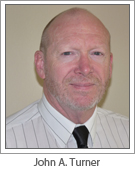227th ECS Meeting | Chicago, IL | May 25, 2015
Hydrogen from Photoelectrochemical Water Splitting – What’s it gonna’ take?” 
John A. Turner, Ph.D. has made an immense impact on the field of electrochemistry due to research in hydrogen production and innovation in fuel cells.
Dr. Turner has studied under highly notable pillars of electrochemistry, such as Fred Anson and Heinz Gerischer. He joined the National Renewable Energy Laboratory in 1979 – where he is now a Research Fellow – and began his work on photoelectrochemical water splitting for hydrogen production. Among his many honors and awards, Turner received the U.S. Department of Energy Office of Science Outstanding Mentor Award for his work with undergraduate students.
He has also received awards from the Midwestern Research Institute, Hydrogen Technical Advisory Panel, and Idaho State University. With over 160 peer-reviewed publications, Dr. Turner’s work focuses on direct conversion (photoelectrolysis) systems for hydrogen production from sunlight and water, catalysts for the hydrogen and oxygen reactions, materials for advanced fuel cell membranes, and corrosion studies of the fuel cell metal bipolar plates. His lecture is set to focus on hydrogen from photoelectrochemical water splitting.
Five Questions with John A. Turner
ECS Executive Director Roque Calvo sits down with the National Renewable Energy Laboratory’s John A. Turner to talk about all things renewable energy and try to connect the dots between the science, our everyday lives, and the sustainability of the planet.
Listen to the first ECS Podcast below and download it for free! (Also available through the iTunes Store and RSS Feed.)
What spiked your interest in renewable energy?
I’m originally from Idaho and my grandparents had a farm and they homesteaded out there, and I sort of got the feeling of the earth and renewing and that sort of thing. As I started to go through university degree programs on the way to a Ph.D., it became more and more apparent that energy issues were going to be one of the key issues coming to society.
What role does electrochemistry have in energy sustainability?Electrochemistry nowadays is really the key. We have fuel cells, we have electrolyzers, and we have batteries. All of the things going on in transportation and storage. It all comes down to electrochemical energy converters.
Where do you think renewable energy will go in the future?
Unfortunately what I have to tell students in particular and audiences in general is that it’s really up to the politicians to change the energy infrastructure. We have pretty much all the technologies we need. We certainly need to be able to upscale them and get things cheaper. The issue is how do you replace an essentially established infrastructure with a new one? What’s your motivation for changing it? You need political support.
Are you seeing more engineering and science undergrads getting into renewable energy?
Absolutely. I find that some of the most enthusiastic people are the students. They realize that people my age probably won’t see any big changes as far as the energy infrastructure, but today’s students are the ones who are going to have to come up with the technologies and push these things forward because it’s going to be their world and they have to live with whatever it is we give them and change it.
How can we change the energy infrastructure?
I encourage students to consider getting involved with politics. Politicians are the only ones with the power and the authority to really make changes in this enormous energy infrastructure and they need really good solutions and they need to be able to trust the people they’re talking to, and I don’t think scientists in general have been very good about interacting with politicians. There isn’t a good communication between scientists and politicians and the students can change that.
top^
